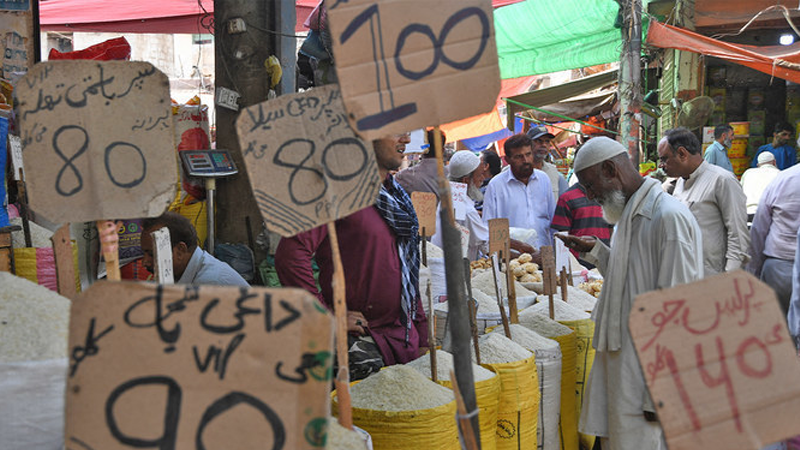Pakistan’s headline inflation rate fell to 11.09 per cent in July 2024, the lowest since October 2021, according to the Pakistan Bureau of Statistics (PBS). This decrease is attributed to the base effect, which economists say masks persistent inflationary pressures in the economy.
The base effect refers to the impact of a high inflation rate in the previous year on the current year’s rate, making the current rate appear lower. Despite this effect, July’s inflation rate is a significant drop from the multi-decade high of 38pc recorded in May 2023. Last month, inflation stood at 12.6pc, while it was 28.3pc in July 2023.
Independent economists view this decline as a positive development for the economy, suggesting it could lead to lower interest rates, helping the government manage the budget deficit and reduce debt servicing pressures.
“Currently, 75 to 80pc of Pakistan’s revenues are being consumed by debt servicing, particularly domestic debt from commercial banks,” said Dr. Ashfaq Hassan Khan, Director General of the NUST Institute of Policy Studies. “It’s a positive development that inflation is on the decline, driven by falling commodity prices globally.”
Khan anticipates that with lower inflation, the interest rate could be reduced to 9-10pc by the end of the year, especially if international oil prices continue to decline and geopolitical stability in the Middle East persists.
The real interest rate, which is the current interest rate minus inflation, stands at 8.4pc, having turned positive in March 2024 after a 37-month gap. This trend has prompted the State Bank of Pakistan (SBP) to consider further cuts to the discount rate.
“Maintaining a high positive real interest rate poses serious risks to debt sustainability,” Khan added. “High real interest rates increase borrowing costs, straining public finances, especially with an already significant debt burden.”
PBS’s monthly Consumer Price Index (CPI) bulletin indicated that the drop in July’s inflation was driven by a substantial easing in housing and utilities prices, which fell to 25.3pc from 35.3pc in June 2024. Prices for restaurants and hotels also declined to 11.2pc from 11.9pc.
However, inflation rose in other sectors. Food and non-alcoholic beverage prices increased to 1.6pc from 1pc, transportation costs rose to 12.2pc from 10.4pc, and clothing and footwear prices climbed to 18.2pc from 17.8pc.
For the fiscal year 2023-24, the CPI averaged 23.41pc, down from 29.18pc in FY23, though still above the government’s target of 21pc. On a month-on-month basis, CPI increased by 2.1pc in July 2024, compared to a 0.5pc rise in June and a 3.5pc increase in July 2023.
Core inflation, excluding food and energy costs, moderated to 11.7pc in July 2024 from 12.2pc in June and 18.4pc in July 2023. Urban inflation fell to 13.2pc from 14.9pc in June and 26.3pc in July 2023, while rural inflation dropped to 8.1pc from 9.3pc in June and 31.3pc in July 2023.
The Wholesale Price Index (WPI) indicated a slight decrease to 10.4pc in July 2024 from 10.6pc in June and a significant drop from 23.1pc in July 2023. The Sensitive Price Indicator (SPI), which tracks essential item prices weekly, recorded a decrease to 15.7pc from 16.6pc in June, down from 2.93pc in July 2023.
Amid these economic indicators, the government reiterated its commitment to addressing the twin deficits, increasing exports, and implementing reforms in taxation, the energy sector, and privatisation of state-owned enterprises. This agenda aligns with the International Monetary Fund (IMF) as its board is expected to meet later this month to approve a $7 billion, 37-month Extended Fund Facility for Pakistan.
Finance Minister Mohammad Aurangzeb and Deputy Prime Minister Ishaq Dar emphasised these priorities at a recent ceremony, noting that the IMF’s approval could pave the way for additional international aid and boost investor confidence.
“Reforms are essential to eliminate dependency on the IMF and foster economic development,” Aurangzeb stated. He highlighted the need for the private sector to play a more significant role in the economy, reducing dependency on banks and external borrowing.
Aurangzeb also announced plans to privatise all public companies, including the entire insurance sector, and stressed the importance of greater transparency and regulatory oversight by the Securities and Exchange Commission of Pakistan (SECP).
Deputy Prime Minister Dar reiterated the government’s focus on boosting exports and managing the twin deficits. “We have substantial potential for growth and development,” Dar said, urging the nation to remain hopeful amidst economic challenges.
Dar also highlighted Pakistan’s mineral wealth, asserting that the country is “asset solvent” despite its $130 billion foreign debt.
In a brief conversation with journalists, Aurangzeb mentioned that Pakistan is working on launching Panda bonds and received several bids from Chinese firms to assist in raising funds through these bonds. This move is part of Pakistan’s strategy to return to global capital markets and improve financial stability.
Overall, the government’s focus on economic reforms and fiscal stability, along with declining inflation, presents a cautiously optimistic outlook for Pakistan’s economic future.
